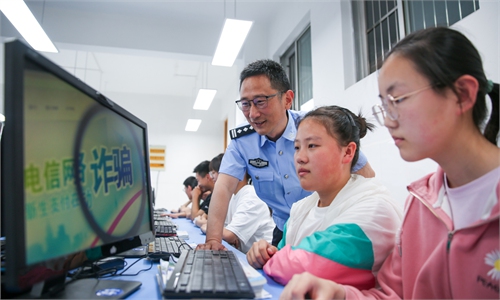Update: Lawmakers work on revision to public security law to better adapt to emerging social realities of today

Law Photo:VCG
Chinese lawmakers are working on a draft revision to the Law on Penalties for Administration of Public Security, to make the law suitable for today's ever-changing social situations and some new problems.
The bill was deliberated by the top legislature at the fifth session of the Standing Committee of the 14th National People's Congress on Monday morning. Some 165 members attended the session.
According to the Xinhua News Agency, the proposed draft prohibits actions such as cheating on exams, orchestrating pyramid schemes, impeding the safe operation of public transport vehicles, dropping objects from buildings, and non-compliant drone flights.
The draft revision further improves measures and ranges of penalties, including promoting the linkage between public security management penalties and mediation, establishing a system of leniency in admitting mistakes and penalties, and appropriately increasing the range of fines.
The draft revision also focuses on strengthening the protection of minors, specifying that actions damaging the rights and interests of minors will result in harsher punishments.
When inquiring juvenile suspects under the age of 16, the suspect's parents or guardians, or other eligible adults, should be present, according to the draft.
The revision of the law aims to better adapt to new situations and new requirements in public security administration work, Xinhua reported on Monday.
The proposed revision incorporates into the scope of public security management and penalties some new situations and problems, recognizes some practices into law, and optimizes the procedures for management and imposition of penalties, with the aim to better maintain social order.
The current Law on Penalties for Administration of Public Security was enacted in 2005 and amended in 2012.
Eleven years have passed since the last amendment to the law. Now is the proper time for amendments that adapt to the current state of things to be introduced, Meng Bo, a lawyer at Beijing Jingsh Law Firm, told the Global Times on Monday, pointing out that laws tend to lag behind in comparison with ongoing social changes.
The draft revision is an important manifestation of scientific legislation, which can provide a legal basis for the relevant departments to strictly enforce the law and fairly administer justice, Meng said. It can also effectively promote law-abiding by the whole nation, realizing the unity of legal effect and social effect.
For example, objects being dropped from buildings has long been a concern for urban residents. The offense has now been added to the latest draft revision of the Law on Penalties for Administration of Public Security as a punishable act, which is an effective convergence of the relevant provisions of the Civil Code and the Criminal Law amendments, and can effectively safeguard people's lives and safety, Meng said.
Observers also pointed out that some of the offenses related to technology and the internet have emerged in recent years. These behaviors used to be in a gray area, but will be punished after the revision.
Over the past few years, revisions to the Law have been publicly discussed on several occasions. In January 2017, the Ministry of Public Security (MPS) released a public consultation draft of revisions to the Law. At the National People's Congress (NPC) meetings over the past two years, there have also been many occasions when delegates have proposed relevant motions.
Other drafts and draft revisions were also reviewed during Monday's session, including a draft foreign state immunities law, a draft preschool education law, and a draft academic degrees law.


